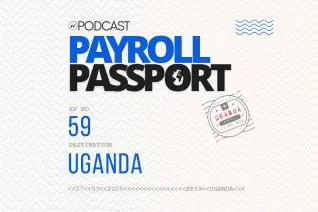Country Spotlight: Payroll in the United Kingdom

When it comes to global expansion plans for many enterprises, the United Kingdom is a priority, primarily because of its efficient regulatory environment and geographic location. However, payroll is far from straightforward for many multinational managers and companies who want to do business in the UK.
Payroll in the country involves several factors that may affect business operations. Additionally, a lack of thorough legal understanding might result in errors and issues with compliance.
The country has long been a hub of innovation and creativity. But before investing time and money in UK operations, multinational corporations must first grasp the subtleties of the nation’s employment standards, payroll regulations, and tax obligations.
The UK has built a robust, sizable corporate infrastructure and a well-developed and efficient payroll and payroll tax system. The law specifies the minimum salary and the necessary tax and social security deductions.
Additionally, the government offers a real-time system for tracking and collecting all payments from businesses. Companies are accountable for the correct and prompt computation and payment according to different laws for employees and contracts. Regardless of whether payroll is handled internally or externally, it is still the company’s legal obligation to adhere to UK payroll regulations. Failure to comply or submission of incomplete information results in severe consequences.
When a new company begins operating in the UK, it must register as an employer with HM Revenue and Customs (HMRC). This process provides HMRC with all the relevant company information, such as the corporation’s trade name, registration address, etc., for them to recognize it as a trading business. More importantly, this process also gives the company reference numbers to contact HMRC in the future and ensures they receive full credit for any further payments of national insurance and income tax.
PAYE and Payroll
Employers are required to run PAYE (Pay As You Earn) as part of their payroll if their employees are paid £123 or more a week, get expenses and benefits, have another job or get a pension. The PAYE system is used by Her Majesty’s Revenue and Customs (HMRC) to collect employees’ income tax and social security.
Even if they have one employee, all businesses must register as employers and set up their PAYE (Pay As You Earn) system. HMRC uses PAYE to collect income tax and national insurance from workers directly at the source.
Taxation Rules in the United Kingdom
Organizations must abide by the UK’s Real Time Information (RTI) system, which mandates submitting all payroll data to HMRC through the PAYE system. Information about payments, income taxes, and social contributions must be disclosed every time an employee is paid.
Hiring a committed and knowledgeable staff to handle global payroll administration may be the best approach to maintain compliance during these times of transition. The right global payroll solution offers the flexibility to scale up or down to keep up with your demands and assist your organization in maintaining its growth trajectory.
Neeyamo can provide complete payroll outsourcing for your business in the UK. We follow a round-the-clock approach to ensure your payroll operations have real-time support while fully conforming with local laws and customs. Get in touch with us to learn more about our services.
Latest Resources
Stay informed with latest updates
If you're curious and have a thirst for knowledge pertaining to the HR, payroll, and EOR universe, don't miss out on subscribing to our resources.
















